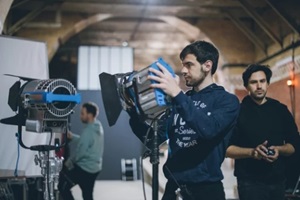 Insurance for feature film production is a non-negotiable part of any project, but simply purchasing the cheapest policy may cause studios to run afoul of multiple issues. Not only may they fail to be protected for the true value of their losses should something go wrong, but they might also face compliance and regulatory violations for their inadequate coverage.
Insurance for feature film production is a non-negotiable part of any project, but simply purchasing the cheapest policy may cause studios to run afoul of multiple issues. Not only may they fail to be protected for the true value of their losses should something go wrong, but they might also face compliance and regulatory violations for their inadequate coverage.
Before you begin planning for your next shoot, be sure that you carefully review your insurance information to confirm compliance and coverage.
Here is an overview of what to know about ensuring compliance in film production insurance, including how much protection to carry and what types of policies are most important.
What’s Covered Under Film Production Insurance?
Generalized film production insurance is an umbrella under which multiple pieces of insurance coverage fit together to create a comprehensive whole. Typically, film production insurance will include a mixture of liability, errors & omissions, equipment, and workers’ compensation insurance types.
However, each area will have its limits and exclusions. Thus, studios may need to purchase riders or additional policies to ensure they have the protections needed for their project scope.
Key Regulatory and Contractual Obligations
Studios will typically face numerous regulatory and contractual mandates based on the types of shoots they are doing and where these shoots are taking place. Municipalities all have their own rules, so there is no singular answer on what regulations and compliance issues may arise. In general, expect that for most metro areas:
- Studios must carry at least $1,000,000 in commercial general liability coverage.
- The general liability insurance must be based on occurrences, not claims made.
- The company issuing the insurance must achieve a baseline rating (usually somewhere around an A or A-) from reputable sources such as Fitch or Moody’s.
- Certain cities may require city officials and employees to be covered as additional insured.
- Shooting cannot begin until a COI (certificate of insurance) has been provided.
- If automobiles are included in the production (this includes camera cars), auto liability insurance must cover at least one million per accident.
- Workers’ compensation must be included at an amount not less than one million per accident.
- A cancellation provision must be included.
 These are the most common baselines. However, each municipality is free to make its own rules, which is why it is essential to partner with an experienced insurance provider who can help you remain in compliance no matter where a shoot takes you.
These are the most common baselines. However, each municipality is free to make its own rules, which is why it is essential to partner with an experienced insurance provider who can help you remain in compliance no matter where a shoot takes you.
Essential Coverage Components
Every film production studio should consider the following insurance coverages as a standard part of their production insurance package:
- General liability: As noted, most studios cannot secure permits without carrying a minimum level of general liability insurance. This type of coverage protects third parties around the shoot and their property from damage that may occur as a result of the production. If a member of the public is hit in the head with a boom or a piece of lighting equipment falls on their car, a general liability insurance policy would cover the damages (such as medical bills or repair costs).
- Cast & crew: Studios will typically need multiple types of insurance to cover all the people working on their project. While workers’ compensation insurance (usually mandatory) protects the many behind-the-scenes employees who keep things running, it does not always cover potential injuries to the main talent. Cast insurance can address the financial ramifications if your star gets sick and has to delay filming or even if you have to replace an actor halfway through the production. Together, cast & crew insurance and workers’ compensation provide robust protection for the many people who make film shoots a success.
- Equipment insurance: Filming would not get far without the equipment that drives the production: cameras, lighting, sound setups, and more. Suppose damage causes these items to become inoperable or need to be replaced. In that case, equipment insurance can cover the costs to keep the production on schedule, both in its timeline and budget.
Secure Your Film Production With MFE Insurance
 Any film production will encounter numerous potential risks, from dangers to the cast and crew to the possible harm camera equipment faces every time it swivels to follow the action.
Any film production will encounter numerous potential risks, from dangers to the cast and crew to the possible harm camera equipment faces every time it swivels to follow the action.
The right insurance coverage requires more than just baseline protection—it will also factor in the regulatory and compliance issues that dictate how, when, and to what extent a shoot can continue.
The experts at MFE Insurance have extensive experience in the film production industry, helping our clients navigate the perils their production may face and the regulations by which they must abide. Contact MFE Insurance to learn more about the tailored insurance solutions we offer.
